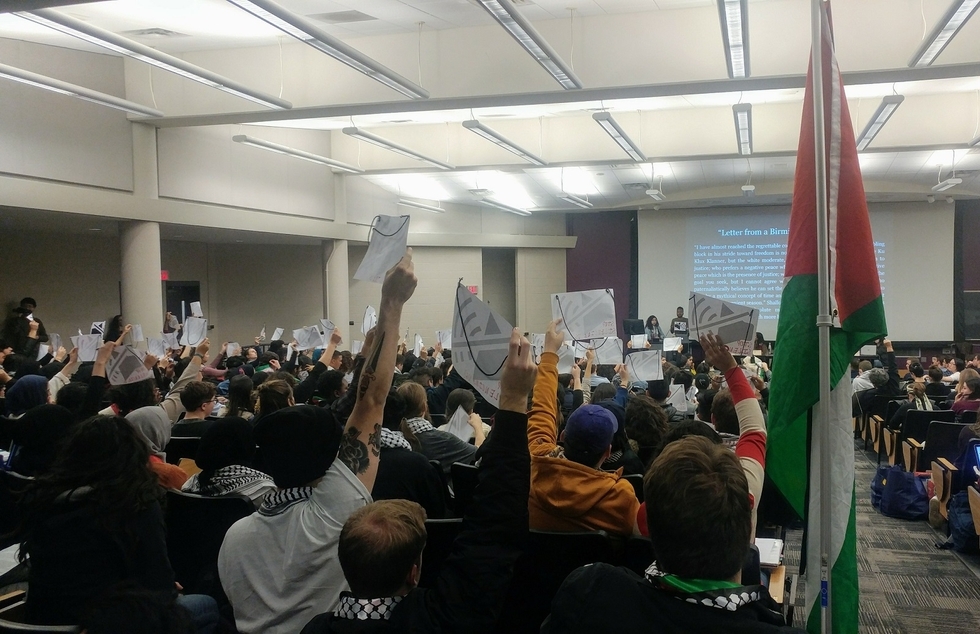US Senate confirms 'crusader' against anti-Israel speech to head civil rights office

The US Senate on Thursday confirmed a pro-Israel advocate as the head of the Office of Civil Rights at the Department of Education (DOE). Rights groups say Kenneth Marcus may use his position to suppress speech critical of Israel on college campuses.
Marcus is the founder of the Louis D Brandeis Centre, which has sued the American Studies Association for boycotting Israel. The centre has also filed several civil rights complaints with the DOE against US universities for hosting pro-Palestinian events that it said created a hostile environment for Jewish students.
Maya Berry, executive director of the Arab American Institute, said in a statement on Thursday: "As we see an increase in hate on college campuses, we need a civil rights office that will protect all students instead of wasting limited resources by reprioritising the goals of the Office of Civil Rights from addressing harassment and acts of hate to policing political discourse."
Marcus will likely exert DOE pressure on colleges and universities to punish and censor speech, activism, art, and scholarship that focuses on Palestinian rights
- Rahul Saksena, Palestine Legal
As the head of the Office of Civil Rights, Marcus will oversee civil rights investigations on college campuses. Activists fear that he will crack down on criticism against Israel instead of tackling complaints against discrimination.
Since Marcus's nomination by President Donald Trump in 2017, rights groups and free speech advocates have urged lawmakers to block the appointment.
The Senate confirmed Marcus on Thursday in a narrow 50-46 vote.
"An opponent of academic freedom, Marcus has spent years aggressively trying to silence pro-Palestinian professors and students and censor criticism of Israeli policies on US college campuses," the American-Arab Anti-Discrimination Committee (ADC) said in a statement in April.
The American Civil Liberties Union (ACLU) has also raised concerns about Marcus, questioning his commitment to upholding all students' civil rights.
ACLU staff attorney Brian Hauss described Marcus in January as a "passionate crusader against students and others who criticise the Israeli government".
"In previous government positions, (Marcus) has led political attacks on programs designed to ameliorate the historic effects of discrimination," Hauss wrote.
"More recently, he has played a central role in advocating for the suppression of student speech — particularly speech critical of Israel."
Marcus's confirmation comes on the heels of the introduction of a bill in Congress that advocates say conflates criticism of Israel with anti-Semitism.
The bill, which would provide the DOE with a legal definition of anti-Semitism to handle discrimination claims, provides a list of examples where anti-Semitism "manifests itself with regard to the state of Israel," which include applying double-standards for Israel, attempting to delegitimise it and comparing Israeli policies to Nazi Germany.
Such measures come at a time when several states are implementing laws against boycotting Israel. Critics of the laws say they violate the First Amendment of the US Constitution, which protects free speech, including boycotts.
Amer Zahr, a Palestinian American activist and comedian who teaches law at the University of Detroit Mercy, said the legislative and political attacks against the Boycott, Divestment and Sanctions (BDS) movement demonstrate its success.
"I view these anti-BDS measures as a major victory for us," he told Middle East Eye. "This is showing that BDS is extremely effective, especially on college campuses; it's a way of showing that the traditional pro-Israel, Zionist groups and forces in this country are genuinely scared of it."
He called Marcus's appointment "damaging," but stressed that efforts to silence criticism of Israel would be struck down if challenged in courts.
Pointing to Jews who support Palestinian rights, Zahr said labelling speaking out against Israel as anti-Semitic is a "rhetorical political device to end the debate because they do not want to engage about the substance because when they do that, they lose".
Palestine Legal, a Chicago-based non-profit that aims to protect the constitutional rights of pro-Palestine advocates, has warned that Marcus's confirmation is a "troubling prospect" even in the Trump administration, where appointees have been hostile to the very missions of the departments which they are tasked to lead.
"Marcus will likely exert DOE pressure on colleges and universities to punish and censor speech, activism, art, and scholarship that focuses on Palestinian rights, using the discredited legal theory that criticism of Israeli government policies is inherently anti-Semitic," Rahul Saksena, a staff attorney with Palestine Legal, told Middle East Eye in an email earlier this year.
In February, J Street, a liberal Jewish group that describes itself as pro-Israel and pro-peace, called on Jewish organisations not to back Marcus solely because of his stance on Israel, noting his lack of commitment to protect LGBT students and victims of sexual violence on campus.
"This is part of a disturbing pattern. Time and again, we have seen some Jewish communal leaders defend and legitimize problematic public figures and elected officials because of their perceived support for Israel, while ignoring other crucial ways in which they are out of step with our core principles," Zoe Goldblum, president of the J Street U National Student Board, said in a statement then.
Stay informed with MEE's newsletters
Sign up to get the latest alerts, insights and analysis, starting with Turkey Unpacked
Middle East Eye delivers independent and unrivalled coverage and analysis of the Middle East, North Africa and beyond. To learn more about republishing this content and the associated fees, please fill out this form. More about MEE can be found here.




